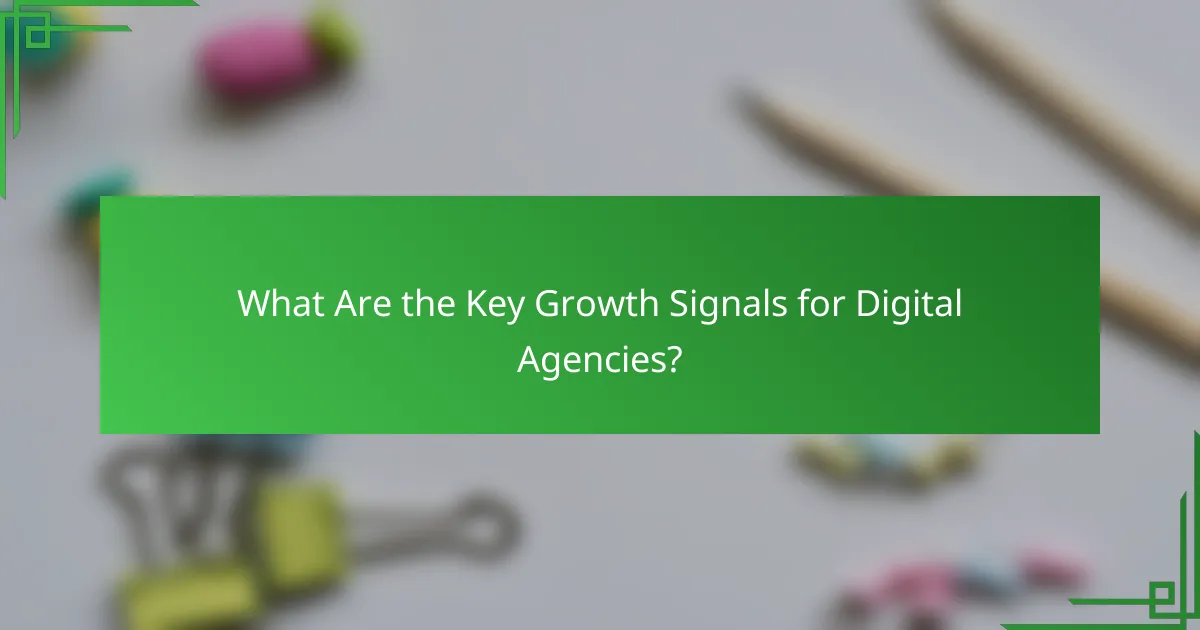Starting a digital agency requires a keen understanding of growth signals, such as client acquisition metrics and market demand, which can guide your strategy and expansion efforts. The timing of your launch is crucial; it should align with both market readiness and your personal preparedness for the entrepreneurial journey. To achieve sustainable growth, agencies must employ a mix of content marketing, SEO, PPC advertising, and social media strategies, all tailored to engage their target audiences effectively.

What Are the Key Growth Signals for Digital Agencies?
Key growth signals for digital agencies include metrics that indicate client acquisition, revenue trends, market demand, client retention, and social media engagement. Monitoring these signals helps agencies assess their performance and identify opportunities for expansion.
Client Acquisition Rates
Client acquisition rates measure how effectively a digital agency attracts new clients. A healthy acquisition rate typically falls between 10-30% monthly, depending on the agency’s size and market niche. Tracking this metric helps agencies refine their marketing strategies and optimize their sales processes.
To improve client acquisition, agencies should focus on targeted marketing campaigns, networking, and leveraging referrals. Regularly analyzing client acquisition sources can reveal which channels yield the best results.
Revenue Growth Trends
Revenue growth trends indicate the financial health of a digital agency over time. A consistent monthly growth rate of 5-15% is often seen as a positive sign, suggesting that the agency is successfully scaling its operations. Understanding these trends allows agencies to forecast future earnings and make informed budgeting decisions.
Agencies should regularly review their revenue streams, identifying which services contribute most to growth. Diversifying service offerings can also help stabilize revenue in fluctuating markets.
Market Demand Indicators
Market demand indicators reflect the overall interest in digital services within a specific industry. Agencies can gauge demand through market research, client inquiries, and industry reports. High demand often correlates with increased project opportunities and higher pricing power.
Staying updated on industry trends and emerging technologies can help agencies align their services with market needs. Engaging in continuous learning and adapting to changes can position an agency as a leader in its niche.
Client Retention Metrics
Client retention metrics measure how well an agency maintains its existing client base. A retention rate of 70-90% is generally considered healthy, indicating strong client satisfaction and loyalty. High retention rates reduce the need for constant new client acquisition, leading to more stable revenue.
To enhance client retention, agencies should focus on delivering exceptional service, maintaining regular communication, and soliciting feedback. Implementing loyalty programs or offering value-added services can also strengthen client relationships.
Social Media Engagement Levels
Social media engagement levels reflect how effectively an agency interacts with its audience online. Metrics such as likes, shares, comments, and follower growth are crucial for assessing brand visibility and audience interest. High engagement levels often translate into increased brand awareness and potential client inquiries.
Agencies should actively manage their social media presence by posting relevant content, engaging with followers, and analyzing performance metrics. Regularly adjusting strategies based on engagement data can enhance overall effectiveness and reach.

When Is the Right Time to Start a Digital Agency?
The right time to start a digital agency is when you identify a strong market demand and feel personally prepared to take on the challenges of entrepreneurship. Timing can significantly impact your agency’s success, so consider both external market conditions and your internal readiness.
Market Opportunity Analysis
Conducting a market opportunity analysis involves evaluating the demand for digital services in your target area. Look for gaps in the market where existing agencies may not meet client needs effectively. For instance, if you notice a rise in local businesses seeking online marketing but few agencies specializing in that area, it may be a prime opportunity.
Utilize tools like Google Trends, social media insights, and industry reports to gauge interest in specific services such as SEO, web design, or social media management. This data will help you identify potential clients and tailor your offerings accordingly.
Personal Readiness Assessment
Assessing your personal readiness involves evaluating your skills, experience, and financial stability. Consider whether you have the necessary expertise in digital marketing or if you need to invest time in learning. Additionally, ensure you have enough savings to support yourself during the initial phase when revenue may be low.
It’s also crucial to reflect on your willingness to take risks and handle the uncertainties of running a business. If you have a solid support system and a clear vision, you may be more prepared to launch your agency.
Industry Trends and Timing
Staying informed about industry trends can help you determine the best timing to start your digital agency. For example, if there is a growing emphasis on e-commerce due to shifts in consumer behavior, launching an agency that specializes in e-commerce solutions could be advantageous.
Monitor changes in technology, regulations, and consumer preferences that may affect your services. Joining industry forums and attending conferences can also provide insights into emerging trends and potential opportunities for your agency.

What Strategies Drive Growth for Digital Agencies?
Digital agencies can drive growth through a combination of effective content marketing, SEO, PPC advertising, and social media strategies. Each approach requires careful planning and execution to maximize reach and engagement with target audiences.
Content Marketing Approaches
Content marketing focuses on creating valuable, relevant content to attract and engage a specific audience. This can include blog posts, videos, infographics, and case studies that showcase expertise and provide solutions to potential clients.
Agencies should consider developing a content calendar to maintain consistency and relevance. Regularly updating content and repurposing high-performing pieces can also enhance visibility and maintain audience interest.
SEO Best Practices
Search engine optimization (SEO) is essential for improving organic visibility in search results. Key practices include optimizing website structure, using relevant keywords, and ensuring mobile-friendliness.
Agencies should conduct regular keyword research to identify trending terms and phrases. Additionally, building quality backlinks and optimizing local listings can significantly enhance search rankings and drive traffic.
PPC Advertising Techniques
Pay-per-click (PPC) advertising allows agencies to reach targeted audiences quickly through platforms like Google Ads and social media. Effective PPC strategies involve selecting the right keywords, crafting compelling ad copy, and setting appropriate budgets.
Agencies should regularly analyze campaign performance and adjust bids or targeting based on results. A/B testing different ad variations can also help identify the most effective messaging and design.
Social Media Strategies
Social media strategies are crucial for building brand awareness and engaging with audiences. Agencies should choose platforms that align with their target demographics and create tailored content for each channel.
Consistent posting, engaging with followers, and utilizing paid promotions can enhance visibility. Monitoring analytics to understand audience behavior and preferences will inform future content and engagement tactics.

What Are the Prerequisites for Starting a Digital Agency?
Starting a digital agency requires a solid foundation in business planning, legal structure, and funding options. These prerequisites help ensure that your agency is not only viable but also positioned for growth in a competitive market.
Business Plan Development
Developing a business plan is crucial for outlining your agency’s vision, target market, services, and financial projections. A well-structured plan typically includes an executive summary, market analysis, marketing strategies, and operational plans.
Consider using the SMART criteria—Specific, Measurable, Achievable, Relevant, and Time-bound—to set clear objectives. This approach helps in tracking progress and adapting strategies as needed.
Legal Structure Selection
Selecting the right legal structure for your digital agency is essential for liability protection and tax implications. Common options include sole proprietorships, partnerships, limited liability companies (LLCs), and corporations.
For instance, an LLC offers personal liability protection while allowing for flexible tax treatment. It’s advisable to consult with a legal expert to choose the structure that best fits your business goals and local regulations.
Funding Options Exploration
Exploring funding options is vital for securing the capital needed to launch and grow your agency. Common sources include personal savings, bank loans, angel investors, and crowdfunding platforms.
Consider creating a budget that outlines your startup costs, which may range from a few thousand to tens of thousands of dollars, depending on your service offerings and operational needs. This will help you determine how much funding you need and from which sources.

How to Measure Success in a Digital Agency?
Measuring success in a digital agency involves tracking various metrics that reflect performance and growth. Key indicators such as client satisfaction, revenue growth, and project delivery timelines are essential for assessing overall effectiveness.
Key Performance Indicators (KPIs)
Key Performance Indicators (KPIs) are critical metrics that help gauge the success of a digital agency. Common KPIs include client acquisition cost, customer lifetime value, and project completion rates. These indicators provide insights into operational efficiency and financial health.
When selecting KPIs, focus on those that align with your agency’s goals. For instance, if your aim is to enhance client retention, track metrics like repeat business percentage and client satisfaction scores. Regularly review these KPIs to adjust strategies as needed.
Consider creating a dashboard to visualize your KPIs. This can help in quickly identifying trends and areas needing improvement. Aim for a mix of quantitative and qualitative measures to get a comprehensive view of your agency’s performance.

